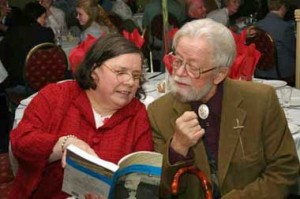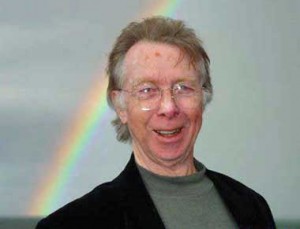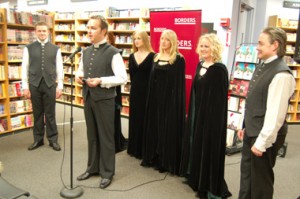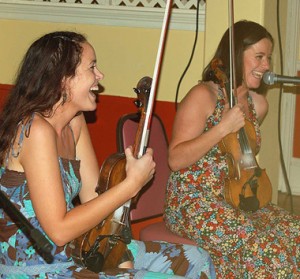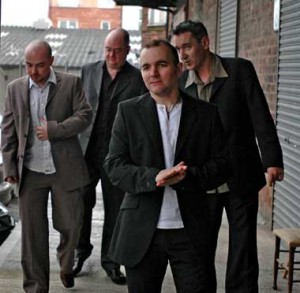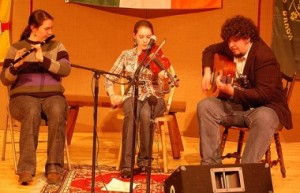Tom Munnelly, called “Ireland’s greatest folksong and folklore collector,” died Thursday, August 30, after a long illness, in Miltown Malbay, County Clare. He was 63.Though a Dubliner by birth, Munnelly moved to this mecca of Irish music with his wife, Annette, in 1978, and became chairman of the Willie Clancy Summer School, the largest gathering of Irish traditional musicians in the world held annually the first week of July.
Referred to as “the last song collector” in a 2006 RTE Radio 1 documentary, Munnelly began collecting and recording traditional music in 1964 and had been a collector and archivist of Irish folk music at the University College of Dublin since 1975. He became well known for recording the music and stories of the travellers, Ireland’s itinerant ethnic minority. (One of the most familiar current traveler musicians is piper Paddy Keenan, who appeared several years ago at the Philadelphia Ceili Group’s annual music festival.)
Munnelly co-founded The Folk Music Society of Ireland (Cuman Cheoil Tire Eireann) and was the first fulltime collector of the National Traditional Music Collecting Scheme, a project initiated by the Irish Department of Education, later folded into UCD’s Folklore Department.
After his move to Miltown Malbay, he started The Folklore and Folkmusic Society of Clare and was chairman and founder of the Clare Festival of Traditional Singing. He also recorded in excess of 1,500 tapes of folksong and folklore, which is the largest and most comprehensive collection of traditional song ever compiled by any one person. Not only that, he transcribed, indexed, and cataloged every note.
This May, many of the leading lights of Irish studies and music published a collection of essays celebrating in Munnelly, called “Dear Far-voiced Veteran: Essays in Honour of Tom Munnelly.” It was presented to the frail Munnelly at a ceremony, attended by his wife and family, at the Bellbridge House Hotel in Spanish Point, County Clare. This June, Munnelly received the honorary degree of Doctor of Literature (DLitt) from the National University of Ireland at Galway in recognition of his contribution to Irish traditional music.
“He is the best collector of folklore that ever existed,” said musician Fintan Malone of Cheltenham who anchors the Tuesday night session at The Shanachie Pub in Ambler and who is a native of Miltown Malbay. “Tom was a good friend of ours. He was a very witty man, with a dry sense of humor. Very gentle, generous, very intelligent and dedicated to collecting folklore. He was very well-liked.”
Malone, who was in Miltown last July for “Willie Week,” said that he saw Munnelly then at Tom Malone’s, the pub Malone owns with his brother, and he looked very gaunt. “I was taken aback. He had been ailing for a while,” Malone said.
Paul Keating, artistic director of the Catskills Irish Arts Week first met Munnelly at the 1976 Festival of American Folklife produced by the Smithsonian Institution for the Bicentennial.
“The world of Irish traditional music lost one of its most dedicated academic voices today when Tom Munnelly left us,” Keating told irishphiladelphia.com. “I was aware of the high regard he had for traditional musicians and they for him because of his work on their behalf. As a song collector and folklorist, he had the personal touch that separated him from the ordinary collector who thinks their job is to put things down on tape or print and so he will be fondly remembered for years for touching so many lives and helping to keep the traditional way of life alive. His battles weren’t always easy but he was a fiercely determined Dubliner who wasn’t easily deterred and that was his way until the end. “
Irish studies teacher and traditional Irish singer, Virginia Stevens Blankenhorn co-taught song seminars with Munnelly (an passionate advocate for sean nos singing) at the Willie Clancy School for two years in the mid-80s.
“These weeks are among my happiest memories. Tom was such fun to be with, always looking for a laugh, always ready to skewer silly ideas, but always (at least in class) with tact and kindness,” said the California native, who now lives in Ireland. “It was no mean achievement to win the trust and regard of both the traditional communities in which he worked and the academic world – especially the latter, given his intolerance for hot air. Irish traditional song has been uncommonly blessed in having Tom as its chief champion and advocate, and I am so sad that heaven claimed him before I could see him again.”
Funeral services for Munnelly will be at St. Joseph Church in Miltown Malbay at 1 pm Saturday,September 1, followed by burial at the Ballard Road Cemetery.

